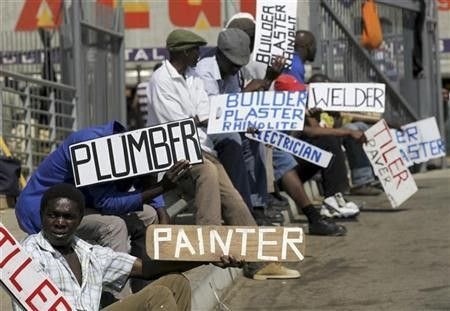S.Africa's jobless rate rises, challenge for govt

South Africa's official jobless rate rose further in the second quarter of this year as the mining and manufacturing sectors shed jobs.
Unemployment is a pressing problem in Africa's largest economy, leading to increased social instability as millions stuck in poverty become disillusioned about their living conditions.
Statistics South Africa said on Thursday the unemployment rate rose to 25.7 percent of the labour force from 25.0 percent in the first quarter.
In its latest quarterly Labour Force Survey, the agency said the total number of unemployed stood at 4.538 million in the three months to June from 4.364 million in the first quarter.
The rand softened immediately after the release at 1130 GMT to 6.6916 to the dollar, from 6.6878 beforehand.
Most sectors gained jobs in the quarter but this was offset by losses in mining, which shed 31,000 jobs and manufacturing which lost 68,000.
The mining sector is currently facing strikes as workers demand wage increases about triple the 5.0 inflation rate.
Asked whether strikes could lead to further job losses, Peter Buwembo, acting executive manger for labour statistics said: "(The strikes) might have an impact but we can't tell at this stage."
Including those who have stopped looking for work, the rate of the unemployed rose to 36.9 percent from 36.5 percent in the first quarter.
South Africa's economy came out of a recession in late 2009 -- the first in nearly two decades -- but key sectors such as manufacturing have been sluggish given the slowdown in the global economy.
The government want to create 5 million jobs by 2020 and has said the economy needs to grow by 7.0 percent a year to reduce joblessness -- more than double the 3.4 percent GDP growth the Treasury has forecast for this year.
DISILLUSIONED
South Africa's unemployed are becoming more frustrated with the ruling African National Congress for doing little to improve their living conditions.
Millions continue to live in abject poverty 17 years after the end of white-minority rule with protests among the poor black majority demanding better services having increased in the past two years.
High wage demands and a change in labour laws that are already seen as rigid, are expected to constrain job creation.
Economists have warned that well-above-inflation settlements erode the country's global competitiveness by driving up the cost for a workforce that is already more expensive and less efficient than those in emerging market rivals.
The average South African factor worker makes about six times more than the average Chinese worker. Employers have also been shedding jobs to pay for the higher wage bills to settle strikes, driving up an unemployment rate.
© Copyright Thomson Reuters 2024. All rights reserved.




















